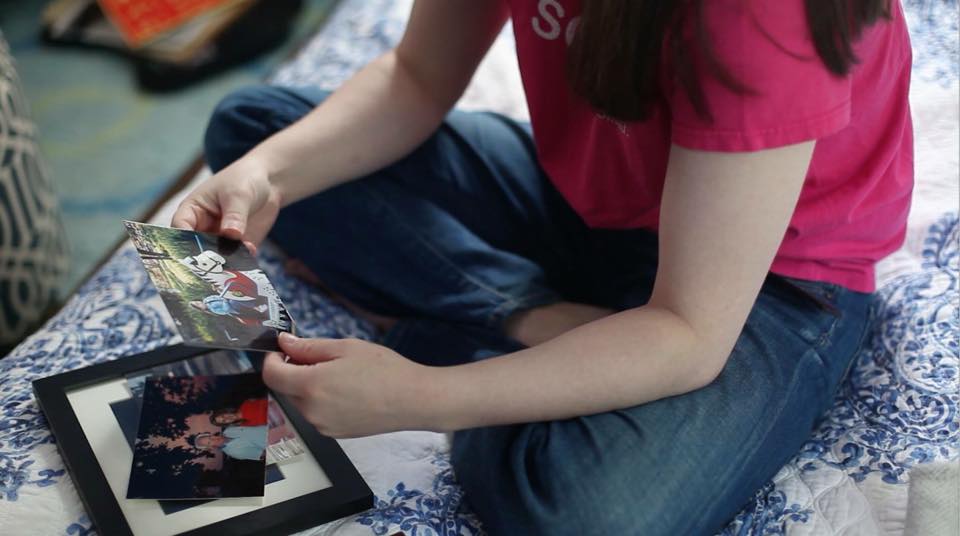

Q: How would you describe your project?
A: As an art major, I’m able to make my senior thesis in any medium. I’ve chosen to make a film that will be a 25-minute documentary about face blindness. Prosopagnosia, or face blindness, is the inability to recognize faces. My motivation for this project emerges from my sister, who has face blindness. Ever since my sister was diagnosed, we have been trying to understand what face blindness means. My sister doesn’t know what it’s like to be face blind, because she doesn’t know what it’s like to not be face-blind. My mission in making my documentary is two-fold. While exploring prosopagnosia, I will make others aware of how we see and navigate the world. And, hopefully, I can help my sister understand how she sees the world.
Q: How did you come up with your project originally?
A: Every day I wonder if people have matching experiences to my sister’s. My sister has always known that there was something very different about her, but before her diagnosis she didn’t know what it was. Growing up, our father and mother just thought she wasn’t making an effort or paying attention when they noticed she didn’t say hi to her classmates. When my sister came home for Thanksgiving during her freshman year at college, she said to my mother, “it bothers me that I’ve been gone for two months and I can’t remember my family. You’re all very vague in my memory.” We realized she navigates the world though recognizing voices. But her audio memory fades if she’s not hearing our voices constantly. My sister likes to be social but she doesn’t know how to approach people when she’s expected to know them. She told me she’s more comfortable talking to strangers, because she feels as though it’s finally an equal interaction. She says most of the time she feels isolated. My sister was only diagnosed with prosopagnosia four years ago, but she knows she has had it her whole life. In my documentary, I want to tell her story and use it as a guiding narrative to elaborate on the tales of others. By exploring prosopagnosia through film, I will reveal the perspectives of people who aren’t able to live according to conventional human truths — the inherent need to feel closely connected to others, to care and be cared for, and to form close bonds with others.
Q: Does your project have an intention?
A: In the documentary, my mission is to illustrate the perspectives of face-blind people, but also to stimulate my audience and make them aware of how we see and navigate the world. What happens when you can’t recognize individuals? We feel connected to our moms, dads, boyfriends, teachers, sisters and friends because they are familiar to us. We see them and distinguish them as individuals who understand us, are kind to us, and affect us. Yet, without that capability to recognize the faces that should be familiar, what happens? People with prosopagnosia, or “face blindness,” are unable to recognize their friends and family. Besides experiencing the impossibility of fulfilling the basic human instinct to “belong,” people who are face-blind encounter innumerable obstacles. My documentary would aim to innumerate those struggles and explore what living with face blindness is like. I would also like to include the kinds of compensating methods face-blind people come up with in order to recognize others, and also to appear “normal.” Not very often do we discuss disabilities that are hidden from plain sight, but I think it’s a significant and captivating story to present a disorder so troubling, but so unapparent.
Q: Have you practiced any other arts? Do you think they influenced your project?
A: I have a very long history in photography. I started photographing when I was 14 and have taken a photo class every year up to this semester. I think that way of seeing — visually, compositionally and not aurally — has impacted my cinematic style. I’m also familiar with graphic design, drawing, painting and printmaking. In a lot of ways, art forms are very similar. You can plan as much as you want, but you also have to accept that your finished product may stray from your original intentions.
Q: What is the most challenging part of your project?
A: In making the documentary, I am learning a tremendous amount about the obstacles filmmakers must surmount to produce good work. In every aspect of shooting and editing, I must ask myself, what is captivating about this story? Why should it be shared? How do I respond to the fact that what I’m doing can inherently be exploitative? In making this film I am taking on huge responsibility to accurately represent my sister and face blindness. I have to do her story justice.
I think documentaries are important because they are perceived to represent “the real.” However, it’s also important to note that documentary is not just observation, but also response. And our responses to the truth are subjective. I also find myself juggling with the question — what is art? Does the artist have the duty to entertain or to please? I think art just has to make you feel.